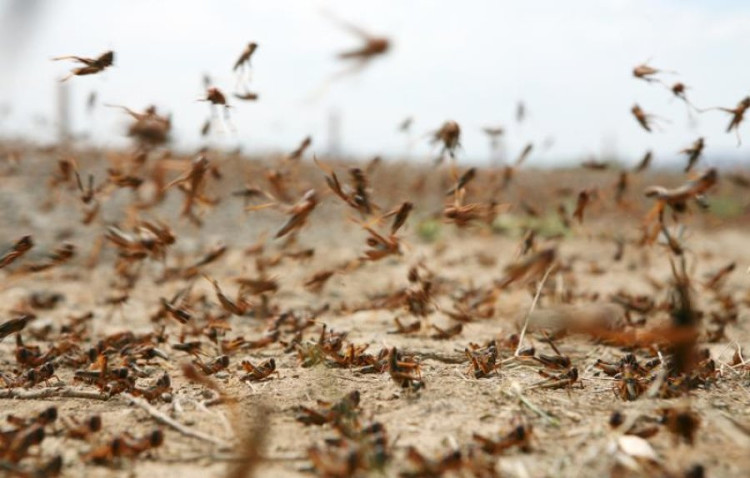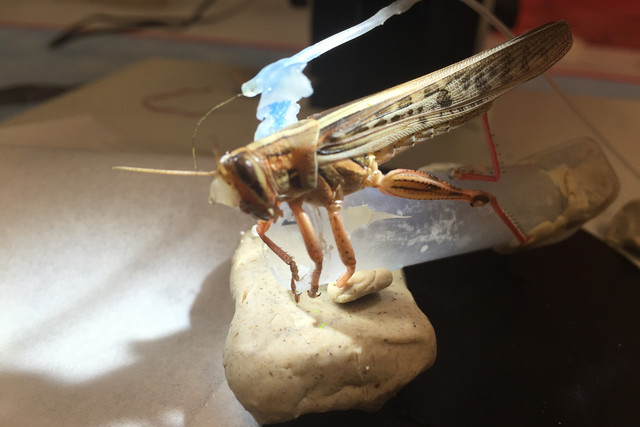This is a species that detects very good explosives
Instead of relying on humans or dogs to detect bombs, why not "send" an army of insects to go on duty?
Previously, the work of detecting landmines and UXO was often done by people with machines or professional dogs, but a US researcher is currently developing technology to allow grasshoppers - specialized insects to kill " crops - can detect explosives in the most difficult to move places.

Grasshopper from worry .
The creator of this unique project is researcher Baranidharan Raman of Washington University in St Louis. According to him, this project will combine the ability to detect certain insects of an insect with specialized electronic devices, creating a "cyborg" creature capable of sniffing complete explosives. good.
This system works by integrating a thermal tattoo on the wings of grasshoppers , which will vibrate when stimulated by a certain temperature, from which scientists can control the direction of flight. this insect. Besides, it also allows them to collect organic specimens from the surrounding air.

. become savior?
When flying to a suspected bomb zone, the grasshopper nervous system will generate a special signal, a small computer attached to its body will read this signal and decode it into a "yes" message or "is not". This message will be sent back to the control team, where if the message is "yes" then a red LED will light up, and if "no" it will be green to prove that area safe.
In response to the question of why not using drones and using living creatures, Raman said he decided to take advantage of the natural olfactory system inside the nose of the grasshopper , because not only did it help save a lot of costs but can also work better than the sensors of many machines.

Scientists decided to take advantage of the natural olfactory system inside the nose of grasshoppers.
"Just a few hundred milliseconds, the brain of the grasshopper was able to start tracking a strange odor that appeared in its surroundings , " Raman told the BBC.
"Even if we create a tiny device that can hold a lot of sensors, if you look at the insects' antennae, that's where there are hundreds and even thousands of other chemical sensors. together".
Currently, the burden of detecting bombs is being done by dogs, because they are the animals that are most capable of sniffing in the animal world. But they also have obvious disadvantages. Firstly, it takes a lot of time to perfect the training of a professional dog, second, dogs are very close to humans, so when we take them on duty, we are also somewhat worried about them. , and also quite a lot of difficult animal rights issues.

"Cyborg grasshoppers" can greatly reduce damage to humans and professional dogs in investigating explosives.
Raman's "cyborgs" are still in the experimental phase, but he said the technology will be used within two years. The US Naval Research Office has also funded $ 750,000 for this project.
According to Liao of China statistics in 2008, the remaining minefields claimed the lives of 15,000 to 20,000 people each year, the number was even more injured.
If successful, this technology has the potential to completely change the way mine crews operate. Instead of relying on humans or dogs to detect bombs, why not "send" an army of insects to go on duty?
- The plant species detects explosives
- Detects explosives at long distances through obstructions
- The 5 most powerful non-nuclear explosives in the world
- Development of explosive detection equipment to replace professional dogs
- Sensor detects explosives in the ground
- New compound is 1.5 times stronger than TNT
- Find out how to make super-strong explosives at relatively low pressures
- The great sacrifice behind the invention of the world's most destructive weapon
- Surprised species of plants detect explosives
- The United Nations remains a post-war way to prevent landmines
- Scanner detects explosives
- Dogs are species that are able to find the best explosives
 Animal 'suffering' after hibernation
Animal 'suffering' after hibernation Why do goats climb well?
Why do goats climb well? Scientists were surprised to see chimpanzees eating turtles
Scientists were surprised to see chimpanzees eating turtles Giant catfish died deadly due to drought in Thailand
Giant catfish died deadly due to drought in Thailand